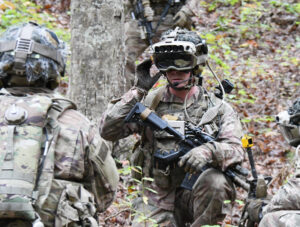The Army has pushed back its timeline for the Microsoft [MSFT]-built Integrated Visual Augmentation System (IVAS) headset, the service confirmed Wednesday, delaying the operational evaluation to next May and setting the first unit equipped date to September 2022.
The service’s Program Executive Office-Soldier did not provide a specific reason for the program delay, but said the decision “allows the Army and industry team to continue to enhance the IVAS technology platform.”

“The Army decided to shift the IVAS Operational Test and fielding to a date later in FY ‘22. The Army is fully committed to its partnership with Microsoft to advance specific technologies to meet operational requirements and maximize warfighter impact,” PEO Soldier wrote in an announcement. “The Army intends to continue developing and fielding this revolutionary, first-of-its-kind technology in FY ‘22.”
Initial operational test and evaluation for IVAS was originally planned for late FY ‘21, according to PEO Soldier.
In late March, the Army awarded Microsoft [MSFT] a deal worth up to $21.9 billion over the next 10 years to move the IVAS program from rapid prototyping into production (Defense Daily, March 31).
“We appreciate the close partnership we have with the U.S. Army and look forward to ongoing iteration with IVAS and the Soldiers using it,” a Microsoft spokesperson told Defense Daily.
The IVAS program has drawn close scrutiny from lawmakers in recent years, with the House Armed Services Committee’s version of the next defense policy bill including a $214 million cut to the program (Defense Daily, Aug. 26).
“I think the Army has some problems meeting their deadlines and we saw that coming. I don’t think it demonstrates that we’re giving up on them at all. It’s an adjustment to what they can actually spend. We looked at that pretty carefully and that adjustment I think is modest compared to where the program is,” a HASC committee aide told reporters during a briefing on the panel’s bill. “It’s a large program. It’s very complex and it’s aggressive. It’s ambitious. We’re all watching it very closely.”
PEO Soldier noted the Army conducted an adversarial electronic warfare and cyber security test with IVAS last month, and plans are in place to continue regular testing throughout FY ‘22.
Jane’s first reported the Army’s intent to adjust the IVAS program schedule.